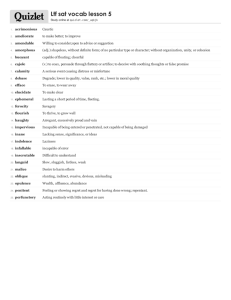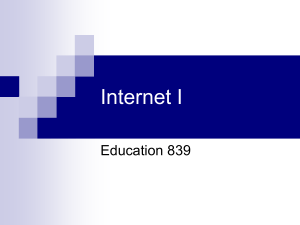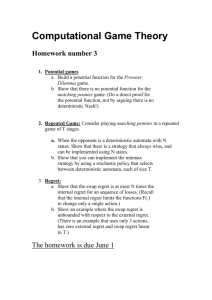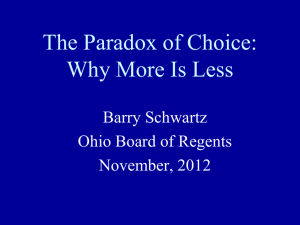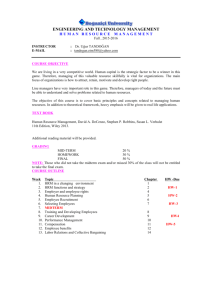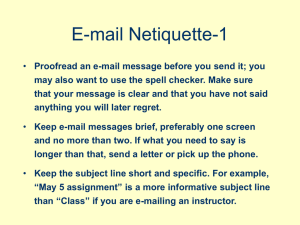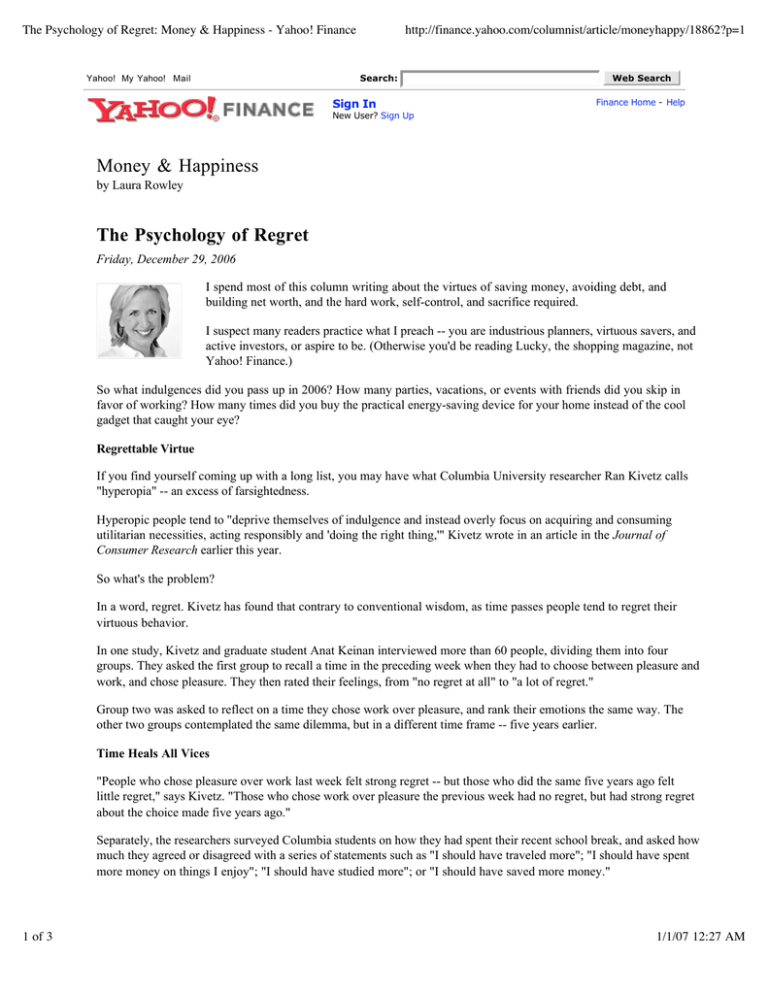
The Psychology of Regret: Money & Happiness - Yahoo! Finance
http://finance.yahoo.com/columnist/article/moneyhappy/18862?p=1
Search:
Yahoo! My Yahoo! Mail
Sign In
Web Search
Finance Home - Help
New User? Sign Up
Money & Happiness
by Laura Rowley
The Psychology of Regret
Friday, December 29, 2006
I spend most of this column writing about the virtues of saving money, avoiding debt, and
building net worth, and the hard work, self-control, and sacrifice required.
I suspect many readers practice what I preach -- you are industrious planners, virtuous savers, and
active investors, or aspire to be. (Otherwise you'd be reading Lucky, the shopping magazine, not
Yahoo! Finance.)
So what indulgences did you pass up in 2006? How many parties, vacations, or events with friends did you skip in
favor of working? How many times did you buy the practical energy-saving device for your home instead of the cool
gadget that caught your eye?
Regrettable Virtue
If you find yourself coming up with a long list, you may have what Columbia University researcher Ran Kivetz calls
"hyperopia" -- an excess of farsightedness.
Hyperopic people tend to "deprive themselves of indulgence and instead overly focus on acquiring and consuming
utilitarian necessities, acting responsibly and 'doing the right thing,'" Kivetz wrote in an article in the Journal of
Consumer Research earlier this year.
So what's the problem?
In a word, regret. Kivetz has found that contrary to conventional wisdom, as time passes people tend to regret their
virtuous behavior.
In one study, Kivetz and graduate student Anat Keinan interviewed more than 60 people, dividing them into four
groups. They asked the first group to recall a time in the preceding week when they had to choose between pleasure and
work, and chose pleasure. They then rated their feelings, from "no regret at all" to "a lot of regret."
Group two was asked to reflect on a time they chose work over pleasure, and rank their emotions the same way. The
other two groups contemplated the same dilemma, but in a different time frame -- five years earlier.
Time Heals All Vices
"People who chose pleasure over work last week felt strong regret -- but those who did the same five years ago felt
little regret," says Kivetz. "Those who chose work over pleasure the previous week had no regret, but had strong regret
about the choice made five years ago."
Separately, the researchers surveyed Columbia students on how they had spent their recent school break, and asked how
much they agreed or disagreed with a series of statements such as "I should have traveled more"; "I should have spent
more money on things I enjoy"; "I should have studied more"; or "I should have saved more money."
1 of 3
1/1/07 12:27 AM
The Psychology of Regret: Money & Happiness - Yahoo! Finance
http://finance.yahoo.com/columnist/article/moneyhappy/18862?p=1
The participants were also asked whether they regretted being too indulgent or exercising too much self-control. The
students just returning from break were roughly equal in expressing guilt or satisfaction with their decisions during
break.
Researchers then posed the same survey to alumni who had graduated 40 years earlier. That group expressed
significantly more regret about being too disciplined and had stronger feelings of missing out. "Time allows you to
escape the influence of indulgence guilt -- and increases feelings of having missed out on the pleasure of life," Kivetz
says.
Hot and Cold Emotions
Nobel Prize-winning psychologist Daniel Kahneman has suggested that guilt is a "hot" emotion -- it burns intensely
and then fades; where a sense of missing out is a colder, more contemplative feeling. When time passes and we focus
on global assessments of happiness, wistfulness about lost opportunities tends to grow.
Kivetz has conducted 20 different studies on the subject over the last dozen years with similar counterintuitive results.
In one study with Professor Itamar Simonson at Stanford, the researchers offered people the opportunity to win $90
cash, or a self-indulgent item (such as a massage) worth slightly less.
Some 40 percent chose the massage, telling researchers that if they took the cash, they would use it for savings or
groceries rather than spend it on themselves.
"We're not talking about catastrophic choices, but everyday dilemmas about working or taking time off, eating fruit
salad or chocolate cake," Kivetz says. "They're not dramatic -- but they become dramatic because choices add up over
time. You delay vacation again and again, and at some point you'll look back and say, ‘I didn't enjoy myself enough.'"
No License to Sin
Of course, for some people, the problem isn't hyperopia; it's myopia, or short-sightedness. They indulge again and
again, and at retirement will look back and say, "I enjoyed myself too much."
Kivetz insists his research "is not a license to sin. I don't think you should make choices based on anticipated regret -that's a good way to make bad choices," he says. "It's a matter of balance."
Striking that balance between when to save and when to spend, when to work and when to indulge, is one of the most
difficult aspects of financial life. The simple solution is to be proactive about balance, and budget for it.
If you're hyperopic, pre-commit to a number of indulgences in the year ahead, and put some money down on them in
advance, so you're less likely to cancel. If you're myopic, automate your long-term savings (having the money
withdrawn from your paycheck week after week) so you're not tempted to blow the cash today.
And then manage your memories. Research has found you can boost happiness (and avoid regret) by capturing a
positive event in a visceral way, with photos, videos, or souvenirs.
For instance, for my husband's birthday this month, I made a photo montage of the year's highlights: the kids in the
snow in Massachusetts; on the beach in Hilton Head, S.C., and Montauk, N.Y.; in Chicago at my mother's 75th
birthday party; and a weekend alone as a couple in Jamaica.
Putting the gift together brought back joyful memories. It also made me realize that on three occasions I worked half of
the trip, bringing along my laptop. As a result, my New Year's resolution is a classic for hyperopics: Leave home
without it.
The columns, articles, message board posts and any other features provided on Yahoo! Finance are provided for personal finance and
investment information and are not to be construed as investment advice. Under no circumstances does the information in this content
represent a recommendation to buy, sell or hold any security. The views and opinions expressed in an article or column are the author's own
and not necessarily those of Yahoo! and there is no implied endorsement by Yahoo! of any advice or trading strategy.
2 of 3
1/1/07 12:27 AM
The Psychology of Regret: Money & Happiness - Yahoo! Finance
http://finance.yahoo.com/columnist/article/moneyhappy/18862?p=1
Copyright © 2006 Yahoo! Inc. All rights reserved. Terms of Service.
To learn more about Yahoo!'s use of personal information, please read the Privacy Policy.
3 of 3
1/1/07 12:27 AM

